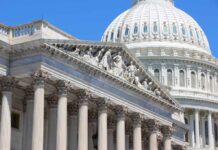
The U.S. Senate passed a controversial renewal of the Foreign Intelligence Surveillance Act (FISA) Section 702 early Saturday morning after a late-night vote that extended beyond midnight. The measure allows the government to conduct warrantless surveillance of foreign nationals outside the United States but also incidentally collects data on U.S. citizens.
Despite substantial bipartisan resistance the bill was approved with a vote of 60-34 and has been sent to Joe Biden who is expected to sign it into law immediately. Constitutional experts and many lawmakers argue that the bill infringes on the Fourth Amendment by allowing the government to access Americans’ communications without a warrant.
Senators from both parties expressed significant concerns about the implications for American citizens’ privacy. Sen. Dick Durbin (D-IL) who pushed for amendments that would require such warrants argued “If the government wants to spy on my private communications or the private communications of any American they should be required to get approval from a judge just as our Founding Fathers intended in writing the Constitution.”
In a speech on the Senate floor last week Sen. Ron Wyden (D-OR) said “The legislation coming from the House gives the government unchecked authority to order millions of Americans to spy on behalf of the government. It says that the government can force cooperation from ‘any other service provider who has access to equipment that is being or may be used to transmit or store wire or electronic communications.'”
Yet again the Senate was asked to consider the question: can liberty be exchanged for security? And sadly the majority of Senators said yes it can.
Final FISA reauthorization passed once again.
— Rand Paul (@RandPaul) April 20, 2024
Despite these concerns the bill passed without any proposed amendments which sought to protect civil liberties. This included amendments from Sens. Rand Paul (R-KY), Mike Lee (R-UT) and others all of which failed to secure enough votes to be included in the final legislation.
Friday evening. “Tonight the Senate was given the chance to vote on amendments to help fix a slew of unconstitutional provisions to RISAA the fake FISA reform bill and truly reform other government spying practices as well. We could have ensured both constitutional rights and national security were protected. Yet again the Senate was asked to consider the question: can liberty be exchanged for security? And sadly the majority of Senators said yes it can” he wrote.
The bill’s passage was not without its drama. As the midnight deadline loomed negotiations and compromises were hastily made to push through the reauthorization including a last-minute agreement that allowed some senators to present their amendments.

































